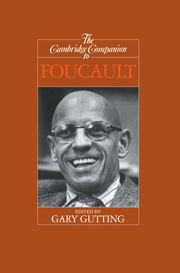Book contents
- Frontmatter
- Introduction: Michel Foucault: A user’s manual
- 1 Foucault’s mapping of history
- 2 Foucault and the history of madness
- 3 The death of man, or exhaustion of the cogito? Translated by Catherine Porter
- 4 Power/Knowledge
- 5 Ethics as ascetics: Foucault, the history of ethics, and ancient thought
- 6 The ethics of Michel Foucault
- 7 “What is enlightenment?”: Kant and Foucault
- 8 Modern and countermodern: Ethos and epoch in Heidegger and Foucault
- 9 Foucault and Habermas on the subject of reason
- 10 “Between tradition and oblivion”: Foucault, the complications of form, the literature of reason, and the aesthetics of existence
- 11 Foucault, feminism, and questions of identity
- 12 Foucault, Michel, 1926–Translated by Catherine Porter
- Bibliography
- Index
8 - Modern and countermodern: Ethos and epoch in Heidegger and Foucault
Published online by Cambridge University Press: 28 May 2012
- Frontmatter
- Introduction: Michel Foucault: A user’s manual
- 1 Foucault’s mapping of history
- 2 Foucault and the history of madness
- 3 The death of man, or exhaustion of the cogito? Translated by Catherine Porter
- 4 Power/Knowledge
- 5 Ethics as ascetics: Foucault, the history of ethics, and ancient thought
- 6 The ethics of Michel Foucault
- 7 “What is enlightenment?”: Kant and Foucault
- 8 Modern and countermodern: Ethos and epoch in Heidegger and Foucault
- 9 Foucault and Habermas on the subject of reason
- 10 “Between tradition and oblivion”: Foucault, the complications of form, the literature of reason, and the aesthetics of existence
- 11 Foucault, feminism, and questions of identity
- 12 Foucault, Michel, 1926–Translated by Catherine Porter
- Bibliography
- Index
Summary
In one of his last essays, one that is uncharacteristic in its positive and programmatic format, Michel Foucault asked: “What is modern philosophy?… modern philosophy is the philosophy that is attempting to answer the question raised by Kant two centuries ago: What is Enlightenment?” Foucault, echoing Kant, answered that Enlightenment is not the name of an epoch but the exit from immaturity to maturity. The possibility of that exit lies in the relationship the philosopher establishes with the use of reason at the present historical moment. Such a philosopher is not searching for origins and uncovering totalities, nor sculpting Utopias. A modern philosopher, one who is curious about the specificity of the present moment, is someone seeking to find out what difference it makes to be thinking today. This is a critical task in the Kantian sense of an exploration of limits. The task is to inquire into the conditions in which the use of reason is legitimate “in order to determine what can be known, what must be done, and what may be hoped.” Such an inquiry entails reflection on the limits of the individual's free use of reason, the political conditions under which that use is possible, and a diagnosis of the current state of affairs. It sits at the crossroads of “critical reflection and reflection on history.” As we will see, it requires an understanding of thought as a practice and critical thought as a specific kind of situated testing and reflection on the results of that testing which is thoroughly active.
- Type
- Chapter
- Information
- The Cambridge Companion to Foucault , pp. 197 - 214Publisher: Cambridge University PressPrint publication year: 1994
- 17
- Cited by

